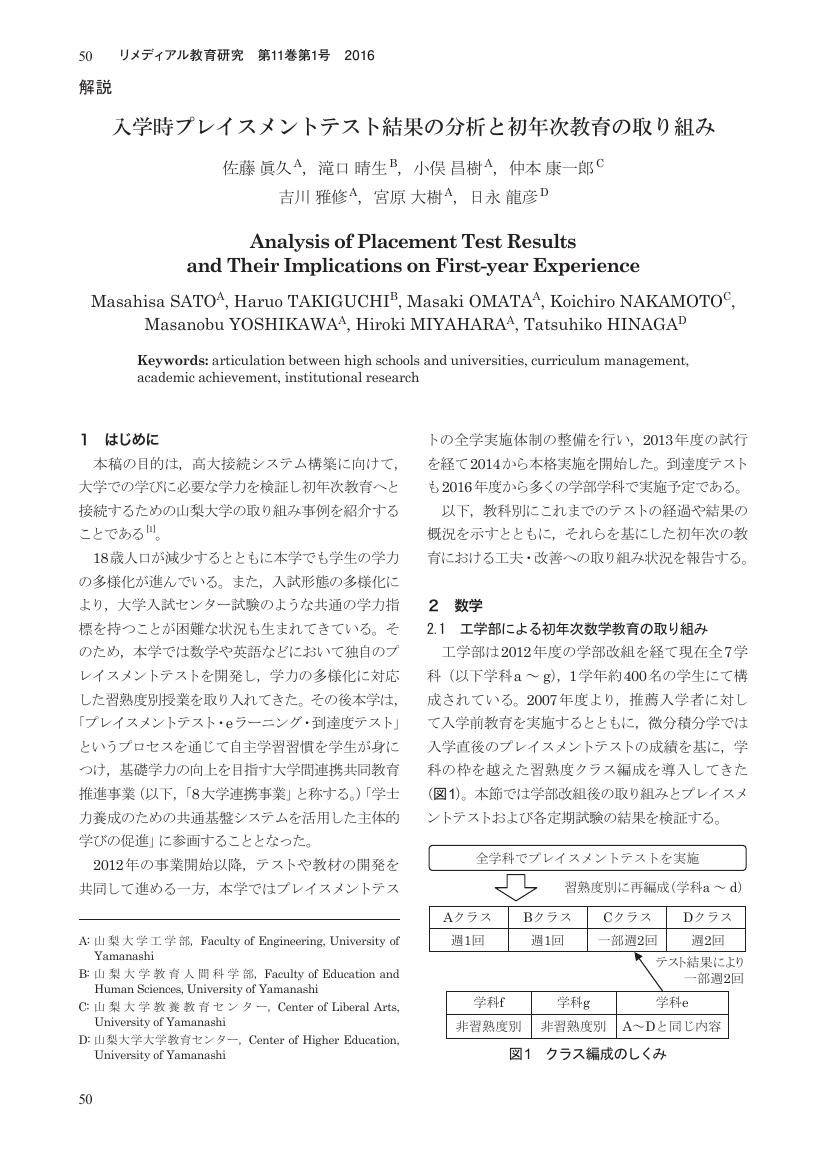5 0 0 0 感性の言語学(1) : オノマトペ再考
- 著者
- 仲本 康一郎
- 出版者
- 山梨大学
- 雑誌
- 言葉の学び、文化の交流 : 山梨大学留学生センター研究紀要 (ISSN:18810292)
- 巻号頁・発行日
- vol.5, pp.3-14, 2010-03-26
認知言語学によって、人間の言語は抽象的な記号系ではなく、われわれの身体やその活動に根ざすものであることがわかってきた。しかし、現在までの身体性の議論では、日本語でいう「感性」の側面は等閑視されている。本研究では、こういった経緯を踏まえ、認知言語学の新たな研究領域として"感性の言語学"を展開する1。今回は、感性の言語学の研究の第一歩として、日本語のオノマトペの研究動向を整理し、新たな研究の方向性を提示する。特に、オノマトペの持つ特徴的な性質である、類像性、身体性、全体性の三つを認知言語学の観点から多角的に分析し、今後の認知言語学が向かうべきオノマトペ研究の指針を示す。
4 0 0 0 OA 語りの構造化・反復・共話を可能にするナラティブ・リアリティの認知的解明
本研究では、日常的な営為によって生み出される語りと、語りが生成する世界に一貫性を求める私たちの心の習慣をナラティブ・リアリティとしてとらえ、人が語ることでいかにしてリアリティを構築しているかを認知的観点から考察した。具体的には、(1)語りが物語標識によって構造化され、一貫性が生み出されていくこと、(2)単一の物語が複数の話者によって共話的に語られうること、(3)同一の物語が反復的に語られることで変容を受け、かつ同一性を保持することに着目し、語りの展開可能性と反復可能性、さらに複数の話者による共話可能性を架橋する潜在的な物語構造の多相的な分析を行った。
1 0 0 0 OA 行為の空間と接近可能性
- 著者
- 仲本 康一郎
- 出版者
- 日本生態心理学会
- 雑誌
- 生態心理学研究 (ISSN:13490443)
- 巻号頁・発行日
- vol.3, no.1, pp.23-34, 2008-12-01 (Released:2021-11-01)
- 参考文献数
- 66
生態心理学は,知覚者を刺激に対する単なる受動的な存在とみなすのでなく,意図や欲求を持って環境のなかを能動的に探索し活動するエージェントとみなす.本稿は,このような生態心理学の知覚・行為観に基づき,空間認知に関わる日英語の言語現象を観察・記述し,周囲の空間が世界を外から眺める観察者の観点からでなく能動的な行為者の観点から見た“行為の空間"として組織化されることを指摘する.特に,空間的な位置の表現が 行為者にとっての“接近可能性“として理解される現象に焦点をあてる.
1 0 0 0 OA メトニミー再考
- 著者
- 仲本 康一郎
- 出版者
- 山梨大学教育人間科学部
- 雑誌
- 山梨大学教育人間科学部紀要 = 山梨大学教育人間科学部紀要 (ISSN:18825923)
- 巻号頁・発行日
- vol.13, pp.302-320, 2012-03-09
1 0 0 0 IR 属性の意味論と活動の文脈--椅子が荷物になるとき
- 著者
- 仲本 康一郎
- 出版者
- 大阪外国語大学日本語日本文化教育センター
- 雑誌
- 日本語・日本文化 (ISSN:09135359)
- 巻号頁・発行日
- no.32, pp.39-61, 2006-05
1 0 0 0 OA 入学時プレイスメントテスト結果の分析と初年次教育の取り組み
- 著者
- 佐藤 眞久 滝口 晴生 小俣 昌樹 仲本 康一郎 吉川 雅修 宮原 大樹 日永 龍彦
- 出版者
- 日本リメディアル教育学会
- 雑誌
- リメディアル教育研究 (ISSN:18810470)
- 巻号頁・発行日
- vol.11, no.1, pp.50-58, 2016-03-31 (Released:2017-02-08)
- 参考文献数
- 3
1 0 0 0 OA メタファーで学ぶ詩学 : 認知言語学の観点から
- 著者
- 谷村 緑 仲本 康一郎
- 出版者
- 一般社団法人大学英語教育学会
- 雑誌
- 大学英語教育学会紀要 (ISSN:02858673)
- 巻号頁・発行日
- no.48, pp.81-93, 2009-03-23
In this study we will explore how metaphors help students comprehend poetry from a cognitive linguistics perspective. A metaphor in cognitive linguistics is not just a figure of speech but is pervasive in everyday language as well as in poetry and fiction (Lakoff & Turner 1989). For example, when English speakers say "we still have a long way to go," they understand life as a journey: LIFE IS A JOURNEY. In this paper we put a special focus on the mega-metaphor which is a type of metaphor effective to develop ideas in poems. It occurs repeatedly throughout a text and works like a central theme. Through the course the students learnt metaphor as a strategy to comprehend and interpret texts and to learn how language works to convey meaning. We analyzed 26 term papers on conceptual metaphors which were developed at poetry in order to evaluate and monitor the students' understanding. We found out that the students for the first couple of months had great difficulties finding metaphorical expressions in light of conceptual metaphors. However, they enjoyed reading poetry once they acquired the strategies for reading it. In the end they were able to read poems as independent learners.

